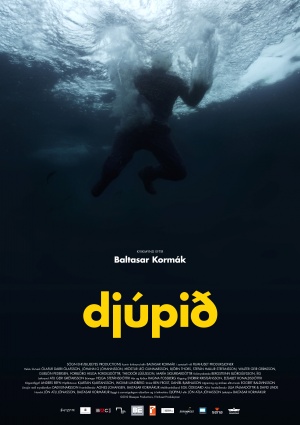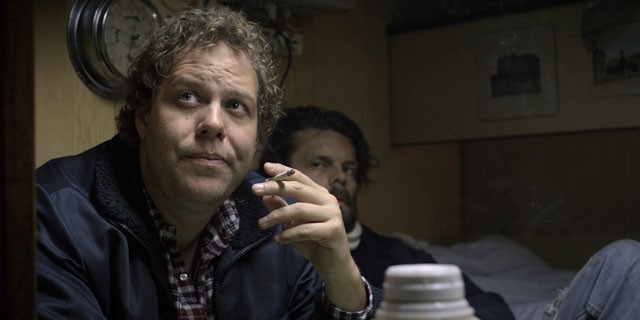Friday May 24, 2013
Movie Review: The Deep (2012)
WARNING: SPOILERS
I kept trying to place Ólafur Darri Ólafsson, the star of “The Deep,” the 2012 movie that was nominated for 16 Edda Awards, Iceland’s Oscars, and won 11 of them, including best picture, director, and actor. It was the second best actor in a row for Ólafsson, even though he’s hardly leading man material. He’s overweight, frumpy, and in Hollywood would be typecast as a villain or the best friend; but in Iceland he’s Tom Hanks. Except he was reminding me of someone else.
At first I thought of Clancy Brown, who played the sadistic guard in “The Shawshank Redemption. I sorted through other options, including Chuck McCann, whom I knew best from the Saturday morning live-action show, “Far Out Space Nuts, ” before it hit me: Vincent D’Onofrio. Both men are charismatic when they want, intense when they want, and both of these factors are important in playing Gulli, a national hero in Iceland, an ordinary man who, one horrible evening, defies the sea, human nature, and, ultimately, science.
Lone man
Gulli is a fisherman on Vestmannaeyjar (Westman Islands), an archipelago off the southern coast of Iceland best-known for a 1973 volcano eruption that forced a month-long evacuation of the entire island. Gulli was a teenager at the time—we see him in flashback—but now it’s 1984 and Gulli’s a young, aimless man. He’s part of a crew of six on a fishing boat, the Breki, but seems to lack the passion or focus of the others.  One is a family man, with a wife and two boys, another has an extensive LP collection and a dog, a third loses himself in drink, a fourth in women. Gulli? He’s just there. At the local bar on a dark frigid evening, he teases the new cook, then comes to his aid when a fight breaks out. His temper, we see, is fierce, but he’s a decent sort. There’s a girl, too, pretty, and a suggestion of a history, but Gulli doesn’t act on it. He still lives with his parents. He still drinks milk from the carton.
One is a family man, with a wife and two boys, another has an extensive LP collection and a dog, a third loses himself in drink, a fourth in women. Gulli? He’s just there. At the local bar on a dark frigid evening, he teases the new cook, then comes to his aid when a fight breaks out. His temper, we see, is fierce, but he’s a decent sort. There’s a girl, too, pretty, and a suggestion of a history, but Gulli doesn’t act on it. He still lives with his parents. He still drinks milk from the carton.
He also seems fairly impervious to cold. On a frigid December morning, when the crew of the Breki is going out despite a recent winter storm, and everything from cars to ropes creak with frost and cold, Gulli is hanging out hatless and gloveless, wearing an unzipped jacket with an open flannel shirt underneath. He’s just hanging.
Going in, we know the boat will capsize but we don’t know why. Is it the weather? Palli (Jóhann G. Jóhannsson), the family man, places a damp drawing his son made for him on a heater. Will that start a fire? We get bits from the crew: the alcoholic throwing up in the engine room; the cook unable to make a good cup of coffee for the captain; the watching of “Jaws” on Betamax and a discussion about thow they need to switch over to VHS.
Early in the day, the fishing nets get caught on something on the bottom of the ocean and the boat tilts precariously before extricating itself. So it’s not that. But it happens again in the evening, and the captain, not wanting to lose the nets, which are new, doesn’t order them cut loose. The boat tilts, and tilts, and finally goes over. The men go in. Most die quickly. Three cling to wreckage: Gulli, Palli, and the Captain. But the wreckage keeps getting swamped. The air temperature, we’re told, is 27 degrees, the water temperature 41, and they’re three miles out. “I’m so cold,” Palli says. “We can’t just die here!” the Captain says, panicking, “we have to start swimming.” He does, leaving the other two, but he doesn’t go far. Gulli spots a nearby boat, shouts and waves, but isn’t heard, and in that moment Palli dies, too. “If you make it … ” he begins to tell Gulli. Then nothing. Then his hand goes limp. Gulli, alone, begins to swim. At which point the camera pulls back and we see a lone man bobbing up against a vast, cold blackness.
On his painful journey, he talks to seagulls, tries to tell jokes (but can’t remember the punchlines), remembers the past, makes promises for the future. He gets angry. He prays. He promises that if he’s given just one more day this is what he’ll do. He won’t drink milk from a carton but from a glass—to please his mother. He’ll visit Palli’s wife and kids and tell them how he died—nobly, and thinking of them. He’ll visit his friend’s dog. He’ll pay off his motorcycle so he’ll have no debts. Then he’ll visit the girl from the bar, the one with whom he has a history. This time he won’t just walk past her house. This time he’ll go in. If he’s given just one more day.
And here his troubles began
One of the most horrifically ironic subtitles I’ve come across is from Art Spiegelman’s “Maus II: A Survivor’s Tale,” which, after the first volume of various Nazi horrors culminating in husband and wife taken to Auschwitz, is subtitled, “And Here My Troubles Began.”
I thought of this when Gulli makes it to shore. It’s still night, it’s still dark, and he’s been through hell. But shore, when he reaches it, is a horror of pounding waves and sharp rocks that lead to a cliff face that can’t be scaled. So he has to go back. He has to go out into the surf again. When he finally finds a cliff face he can scale, and reaches its top, he sees nothing but desolation. The ground is cooled lava and cuts his bare feet. He has to fashion socks out of the arms of his shirt. He keeps throwing up all the salt water he’s swallowed. When he reaches a town, a kid thinks he’s a drunk. When he’s finally taken to a hospital, his body temperature is below 93 degrees. He has no heartbeat. Yet he lives.
There’s confusion at first. He said the boat went down where? And he swam how long? That’s impossible. But they find the wreckage where he said it was. A Reykjavik scientist hears of the tale and is intrigued, since what’s being talked about is scientifically impossible. A man can’t survive that long in temperatures that cold. Studies are done. When they prove inconclusive, Gulli is taken to London where more studies are done. With monitors all over his body, he’s placed in a tub filled with ice with three chiseled members of the Special Forces. Their best lasts 19 minutes. He lasts hours. It’s survival of the unfittest. His body fat is like seal fat, we’re told, but even that doesn’t explain it. He still shouldn’t have lived.
In a way he’s not. His survival is not triumphant at all. He suffers survivor’s guilt, and seems halfway between the living and the dead. And the day he promised if God let him live? Where’s that?
Bring warm clothes
“The Deep,” written by Jón Atli Jónasson and Baltasar Kormákur, and directed by Kormákur, is a quiet, matter-of-fact film that’s as unpretentious as the people it portrays, and much recommended. It’s spare. No real answers are given for what happens, but at some point Gulli has had enough of the tests and he returns to Vestmannaeyjar; and he has that day he promised God. He visits his friend with the LPs and the old dog, who doesn’t respond to him until he puts on the music. Then the dog is his. He visits Palli’s widow and her kids and gives them a kind of closure. But he doesn’t find his. He still doesn’t visit the girl. That’s the part he can’t do. Instead he returns to fishing. He goes out to sea again with another crew. Does he go like Superman? Like someone the sea can’t kill? No. He goes like Gulli.
Did I want more from the end? Yes. But it works. “The Deep” is a movie about blunt facts: what the sea does to you; what the cold does to you. At the end you’ll feel chilled to the bone. Bring warm clothes.

Ólafur Darri Ólafsson, the Tom Hanks of Iceland, before the plunge.
Baseball's Active Leaders, 2023
What Trump Said When About COVID
Recent Reviews
Everything Everywhere All at Once (2022)
Black Panther: Wakanda Forever (2022)
Doctor Strange in the Multiverse of Madness (2022)
Spider-Man: No Way Home (2021)
The Cagneys
A Midsummer Night's Dream (1935)
Something to Sing About (1937)
Angels with Dirty Faces (1938)
A Lion Is In the Streets (1953)
Man of a Thousand Faces (1957)
Never Steal Anything Small (1959)
Shake Hands With the Devil (1959)







